Make Women, Food and God Work for You

Last May, Oprah revealed the answer she'd been waiting for when it came to her relationship with food. "I have come across something so profound that I think [to everyone] who's ever felt [her weight is] a losing battle, here is an opportunity to win," she said. "This has literally broken me open."
New York Times best-selling author Geneen Roth's latest book, Women, Food and God, has had a significant effect on Oprah's life. "[It] blows the doors off of my tumultuous relationship with food," she says. "It's a love/hate thing that so many people have experienced."
Now that viewers have had a chance to read the book and start integrating its lessons into their lives, Geneen is sitting down with Oprah Show audience members to answer their questions and put an end to their ongoing weight battles.
New York Times best-selling author Geneen Roth's latest book, Women, Food and God, has had a significant effect on Oprah's life. "[It] blows the doors off of my tumultuous relationship with food," she says. "It's a love/hate thing that so many people have experienced."
Now that viewers have had a chance to read the book and start integrating its lessons into their lives, Geneen is sitting down with Oprah Show audience members to answer their questions and put an end to their ongoing weight battles.
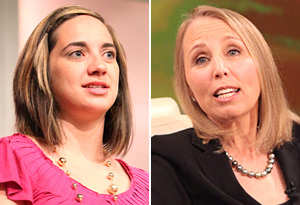
The message of Women, Food and God, Oprah says, can be boiled down to a single passage: "It's not about food. It's not even about feelings. It's about what's below them. What's in between them? What's beyond them?" Oprah says this quote opened her eyes to the fact that struggles with weight are about so much more than shedding pounds or eating fewer calories.
One audience member says she has trouble pinpointing what her weight issue is about, if not food. "As I read your book, I was longing to find something deeper of why I eat so much," Danielle says. "I just like to eat. I like food. ... Is there something deeper that I don't know about? Could it be that I just like food?"
Geneen says the way many women eat doesn't indicate that they necessarily love food. "When you really like something, you pay attention to it and you take time with it. When you like something, you don't eat standing up, you don't eat it in the car, you don't eat sort of shoving the food in your mouth on the way from the stove to the table," she says. "When you like your body, you also pay attention to that, to when it's had enough."
Danielle says she still doesn't know why she doesn't stop eating when she's had enough and wants to get to the bottom of it.
"Here's how you figure it out," Geneen says. "You say to yourself, 'For the next day, I'm going to stop when I've had enough and I'm going to listen to my body, and if I don't even know what that is'—because you're not used to listening to your body—you'll eat slowly and you'll stop at some point before you usually stop. And in that moment, when there's still food left on the plate and you still want to keep going, you're going to stop and there are going to be reasons that are going to come up. Whatever you're eating about is right there. You won't have to look any further than on your plate."
One audience member says she has trouble pinpointing what her weight issue is about, if not food. "As I read your book, I was longing to find something deeper of why I eat so much," Danielle says. "I just like to eat. I like food. ... Is there something deeper that I don't know about? Could it be that I just like food?"
Geneen says the way many women eat doesn't indicate that they necessarily love food. "When you really like something, you pay attention to it and you take time with it. When you like something, you don't eat standing up, you don't eat it in the car, you don't eat sort of shoving the food in your mouth on the way from the stove to the table," she says. "When you like your body, you also pay attention to that, to when it's had enough."
Danielle says she still doesn't know why she doesn't stop eating when she's had enough and wants to get to the bottom of it.
"Here's how you figure it out," Geneen says. "You say to yourself, 'For the next day, I'm going to stop when I've had enough and I'm going to listen to my body, and if I don't even know what that is'—because you're not used to listening to your body—you'll eat slowly and you'll stop at some point before you usually stop. And in that moment, when there's still food left on the plate and you still want to keep going, you're going to stop and there are going to be reasons that are going to come up. Whatever you're eating about is right there. You won't have to look any further than on your plate."
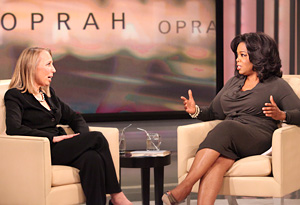
Even better than stopping when you're full, Oprah says, is to not start eating if you're not hungry. "When you go to reach for something in a moment of frustration, anxiety—and for me it's the slightest thing. ... It doesn't have to be something really strong; it's just the slightest little irritation that you feel like a handful of almonds would make things better," Oprah says. "Now to stop myself in that moment that I go to reach for the almond to say: 'Am I really hungry? Why am I reaching for that? What am I really feeling right now?' That has worked wonders for me."
Once you've realized that it's not necessarily food you're craving, the next step is figuring out what you're hungry for, Oprah says. "[Ask yourself]: 'Do I want somebody to listen to me? Do I want somebody to pay attention to me? Do I want to be heard? Do I want to be validated? What do I really want?"
Once you've realized that it's not necessarily food you're craving, the next step is figuring out what you're hungry for, Oprah says. "[Ask yourself]: 'Do I want somebody to listen to me? Do I want somebody to pay attention to me? Do I want to be heard? Do I want to be validated? What do I really want?"
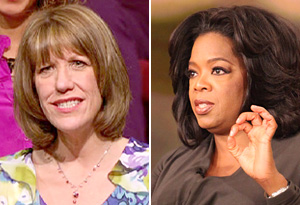
Once you've begun conquering your weight battle, what do you do about friends and family who aren't there yet? One audience member says people around her are envious and not at all supportive of her success and she isn't sure how to deal with them.
Ultimately, your body is your business and no one else's, Geneen says. "In a very nice but gentle way, say... 'It's my body and I'm taking care of it,'" she says.
Oprah says she too has experienced friends' jealousy when she's lost weight, and the key is learning to be okay with it and owning your success. "[It's about] reteaching loveliness to yourself so that you don't have to apologize to anybody for being full of yourself," she says. "What you really want to be is so full of yourself that your cup runneth over so that you can give to other people. There's this whole notion that women have of, 'Oh, I don't want anybody to think I'm full of myself because God forbid if I should be full of myself.'"
Ultimately, your body is your business and no one else's, Geneen says. "In a very nice but gentle way, say... 'It's my body and I'm taking care of it,'" she says.
Oprah says she too has experienced friends' jealousy when she's lost weight, and the key is learning to be okay with it and owning your success. "[It's about] reteaching loveliness to yourself so that you don't have to apologize to anybody for being full of yourself," she says. "What you really want to be is so full of yourself that your cup runneth over so that you can give to other people. There's this whole notion that women have of, 'Oh, I don't want anybody to think I'm full of myself because God forbid if I should be full of myself.'"
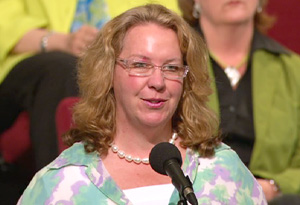
The struggle with weight is often something that can pass through generations. An audience member who says her whole family has always been overweight says she's struggling to prevent her daughter from having similar problems. "I have a beautiful 11-year-old daughter, and she gets home exhausted at the end of her day with soccer and everything and we have a nice dinner and then some little thing gets clicked and she starts: 'Can I have ice cream? Can I have cupcakes?" she says. "I need some help to get her through this thing that I haven't dealt with myself and generations before me haven't figured out."
The best thing women can do for their children in terms of weight struggles, Geneen says, is to conquer their own issues. "Kids mimic what they see perfectly. They internalize it. If she senses, if she sees, if she understands from you that the way a person deals with boredom or, 'I don't really want to go to bed now, so the way I'll delay it is by eating,' she's going to want to do the same thing."
The audience member says she's been trying to zero in on what she herself is hungry for, and has realized she is usually looking for an escape. "'I don't want to be tired,' ' I don't want to be angry at my husband right now.' ... A cupcake can change the channel quickly. Suddenly, I'm at a party instead of angry and my husband or exhausted."
There's nothing wrong with being tired or angry, Geneen says. "To say, 'I don't want to be what I am and who I am,' what do you do with that? There's nothing to do at that point except, Okay, I'll go eat.' How about really respecting your body at that point?"
Oprah encourages women who need to start facing their true selves to do a single exercise. "Look in the mirror and just stand there, naked. Look yourself directly in the eye and see if looking in your own eyes you can't find something there worth bringing yourself back to," she says. "When you bring yourself back, you will also have done the work for your children, because you can't give to your children what you don't have to give them. So the real work for everybody who is a mother, as I see it, is to fill yourself up first so that you will be able to give that to your children."
The best thing women can do for their children in terms of weight struggles, Geneen says, is to conquer their own issues. "Kids mimic what they see perfectly. They internalize it. If she senses, if she sees, if she understands from you that the way a person deals with boredom or, 'I don't really want to go to bed now, so the way I'll delay it is by eating,' she's going to want to do the same thing."
The audience member says she's been trying to zero in on what she herself is hungry for, and has realized she is usually looking for an escape. "'I don't want to be tired,' ' I don't want to be angry at my husband right now.' ... A cupcake can change the channel quickly. Suddenly, I'm at a party instead of angry and my husband or exhausted."
There's nothing wrong with being tired or angry, Geneen says. "To say, 'I don't want to be what I am and who I am,' what do you do with that? There's nothing to do at that point except, Okay, I'll go eat.' How about really respecting your body at that point?"
Oprah encourages women who need to start facing their true selves to do a single exercise. "Look in the mirror and just stand there, naked. Look yourself directly in the eye and see if looking in your own eyes you can't find something there worth bringing yourself back to," she says. "When you bring yourself back, you will also have done the work for your children, because you can't give to your children what you don't have to give them. So the real work for everybody who is a mother, as I see it, is to fill yourself up first so that you will be able to give that to your children."
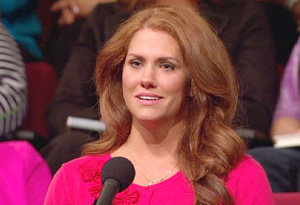
After giving birth to a premature daughter, losing her home to a flood and dealing worth her father's cancer diagnosis, Christine says she ate all her emotions and found herself at 220 pounds. "I decided I needed a goal, so I got on the Internet and I signed up to be a part of the Miss Iowa USA pageant, and I've lost 70 pounds so far," she says. "I'm just worried that after this big event I'm going to fall back and have to feel all of the emotions that I didn't feel in those three months."
Oprah says Christine is dealing with an issue of trusting herself. "I will tell you having had the Oscars® and Emmys® and big awards and ceremonies and this thing and that thing coming up: None of it's enough," she says. "You have to do the holy work."
We can't predict the future, Geneen says. What we can do is use today to change what will happen tomorrow. "We don't know what's going to happen in three weeks or a month. What we do know is if you want to be aware of yourself, if you want to use your relationship with food as the doorway, as a way that you're trying to get through to yourself, then you can start at any time."
Oprah says Christine is dealing with an issue of trusting herself. "I will tell you having had the Oscars® and Emmys® and big awards and ceremonies and this thing and that thing coming up: None of it's enough," she says. "You have to do the holy work."
We can't predict the future, Geneen says. What we can do is use today to change what will happen tomorrow. "We don't know what's going to happen in three weeks or a month. What we do know is if you want to be aware of yourself, if you want to use your relationship with food as the doorway, as a way that you're trying to get through to yourself, then you can start at any time."
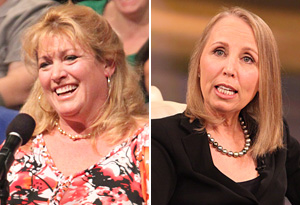
Identifying real hunger can be the trickiest part to losing weight. One audience member says she feels like she's hungry all the time and can't distinguish that feeling from exhaustion or boredom or feeling like she deserves a reward. She says she's even hungry at this very moment. "I would like a cheesecake," she says.
Geneen says many people don't know how to recognize hunger. "Thinking you're hungry isn't being hungry, and if you haven't let yourself be hungry for a long time, it's going to take awhile," she says. "Usually when a body is really hungry it doesn't want cheesecake. That's the mind. That's mind hunger. When a body is hungry and you eat, there's a sort of 'Yes!' When your mind is hungry and you're eating because you're bored or agitated or any other reason, it's sort of just like piling something in. When you're hungry, food is actually satisfying."
So often people eat to avoid other feelings entirely, Oprah says. "When you see yourself and you're eating and eating, you've eaten a bowl of popcorn, you don't even know it's gone and what happened to it, it's because you're trying to numb yourself," she says. "Because if I feel tired, that means I'm going to have to make a decision about giving my body some rest. And if I don't think I can make that decision about giving my body some rest, then I have to do something to make this be okay."
Oprah says Geneen sums this up perfectly in a passage from Women, Food and God. She writes: "Overeating does not lead to rapture. It leads to burping and farting and being so sick that you can't think of anything but how full you are. That's not love. That's suffering."
Geneen says many people don't know how to recognize hunger. "Thinking you're hungry isn't being hungry, and if you haven't let yourself be hungry for a long time, it's going to take awhile," she says. "Usually when a body is really hungry it doesn't want cheesecake. That's the mind. That's mind hunger. When a body is hungry and you eat, there's a sort of 'Yes!' When your mind is hungry and you're eating because you're bored or agitated or any other reason, it's sort of just like piling something in. When you're hungry, food is actually satisfying."
So often people eat to avoid other feelings entirely, Oprah says. "When you see yourself and you're eating and eating, you've eaten a bowl of popcorn, you don't even know it's gone and what happened to it, it's because you're trying to numb yourself," she says. "Because if I feel tired, that means I'm going to have to make a decision about giving my body some rest. And if I don't think I can make that decision about giving my body some rest, then I have to do something to make this be okay."
Oprah says Geneen sums this up perfectly in a passage from Women, Food and God. She writes: "Overeating does not lead to rapture. It leads to burping and farting and being so sick that you can't think of anything but how full you are. That's not love. That's suffering."
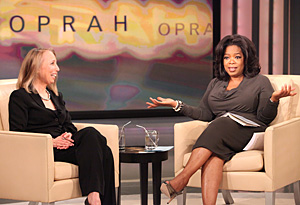
Another difficult aspect of the weight loss battle is the realization that even if you lose all the weight you want to, you still might not think you look perfect. An audience member says that even though she knows she'll probably never look like a supermodel, she's having trouble accepting that.
Geneen says we need to reject the voices in our heads that tell us there's a right and wrong way to do everything. "That voice that's telling you you need to reach for perfection? That's not your friend," she says. "You basically need to know, when you hear that voice, that that voice is not telling you the truth."
Even supermodels have that voice, Oprah says. "Naomi Campbell, who is a gorgeous woman, was here not too long ago. You know how many people it takes to make Naomi Campbell look like Naomi Campbell on a cover? You know many people it took me just to get dressed today to come down here? It's a village. So this ideal that we have sold ourselves of what is perfection is a complete illusion," she says. "As you flip through advertisements or anything you watch on television, everybody is lit to the high heavens. So if you are followed around with a light and a fan, you will, too, look like perfection."
Geneen says we need to reject the voices in our heads that tell us there's a right and wrong way to do everything. "That voice that's telling you you need to reach for perfection? That's not your friend," she says. "You basically need to know, when you hear that voice, that that voice is not telling you the truth."
Even supermodels have that voice, Oprah says. "Naomi Campbell, who is a gorgeous woman, was here not too long ago. You know how many people it takes to make Naomi Campbell look like Naomi Campbell on a cover? You know many people it took me just to get dressed today to come down here? It's a village. So this ideal that we have sold ourselves of what is perfection is a complete illusion," she says. "As you flip through advertisements or anything you watch on television, everybody is lit to the high heavens. So if you are followed around with a light and a fan, you will, too, look like perfection."

At its core, Women, Food and God isn't about losing weight or looking better and eating healthier—it's about finding who you really are. Oprah says that was the biggest lesson she has learned in reading it. "I have for years talked to women who talked about losing themselves. And even in speaking to them I'd be like: 'What are you talking about you lost yourself? You are yourself. How can you lose yourself?' I could not even understand it," she says. "And I will admit to you and to the world, that's what my problem was—I got lost. In the work, in the busyness, in the craziness of my life, I got lost. And in all those years, that's what I've been trying to do is to maintain the center, and when you are away from the center, you can tell. You can see me when I'm on center. I used to call it my fighting weight. My fighting weight is when I'm connected, when I'm balanced, when I'm truly living my best life, because my life is not separate from the life of God."
Ultimately, everybody's journeys are dedicated to reconnecting with their best selves. "What this is about is allowing the weight at this particular time in your life, wherever you are, to be your holiest, most sacred moment with yourself. This is the sacred time," Oprah says. "This is what is meant by women, food and good. Coming back to the sacredness of yourself because every pound, every time you will go to the refrigerator or go to something that you shouldn't and substitute for that which can truly fill you up, you are showing how lost you really are."
Ultimately, everybody's journeys are dedicated to reconnecting with their best selves. "What this is about is allowing the weight at this particular time in your life, wherever you are, to be your holiest, most sacred moment with yourself. This is the sacred time," Oprah says. "This is what is meant by women, food and good. Coming back to the sacredness of yourself because every pound, every time you will go to the refrigerator or go to something that you shouldn't and substitute for that which can truly fill you up, you are showing how lost you really are."
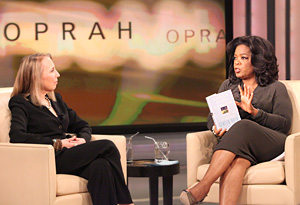
Women eat for many different reasons: because they are frustrated or bored or tired or happy or sad and are resisting those emotions. Geneen says that until women can come to terms with their emotions, they will continue to feed their emotions. "To the extent that you're wanting the situation to change, you are going to be living in frustration. You're going to be living in some kind of anguish, and you're going to be fighting with yourself and the way things are. Whenever you fight with something, you feel miserable."
Oprah says this is meant by the "God" in the title of the book. "It all boils down to one thing: It is your relationship with the source. And the relationship to that which we call God or don't call God or don't even know is God is all that really matters," she says. "When you surrender and stop resisting and stop trying to change that which you cannot change but be in the moment, be fully open to the blessing that you have already received and those that are yet to come to you...when you can claim that and see that, the literal vibration of your life will change."
Get more information on making Women, Food and God a part of your life
Ask Geneen Roth a question!
Share your Women, Food and God aha! moment
Oprah says this is meant by the "God" in the title of the book. "It all boils down to one thing: It is your relationship with the source. And the relationship to that which we call God or don't call God or don't even know is God is all that really matters," she says. "When you surrender and stop resisting and stop trying to change that which you cannot change but be in the moment, be fully open to the blessing that you have already received and those that are yet to come to you...when you can claim that and see that, the literal vibration of your life will change."
Get more information on making Women, Food and God a part of your life
Ask Geneen Roth a question!
Share your Women, Food and God aha! moment



